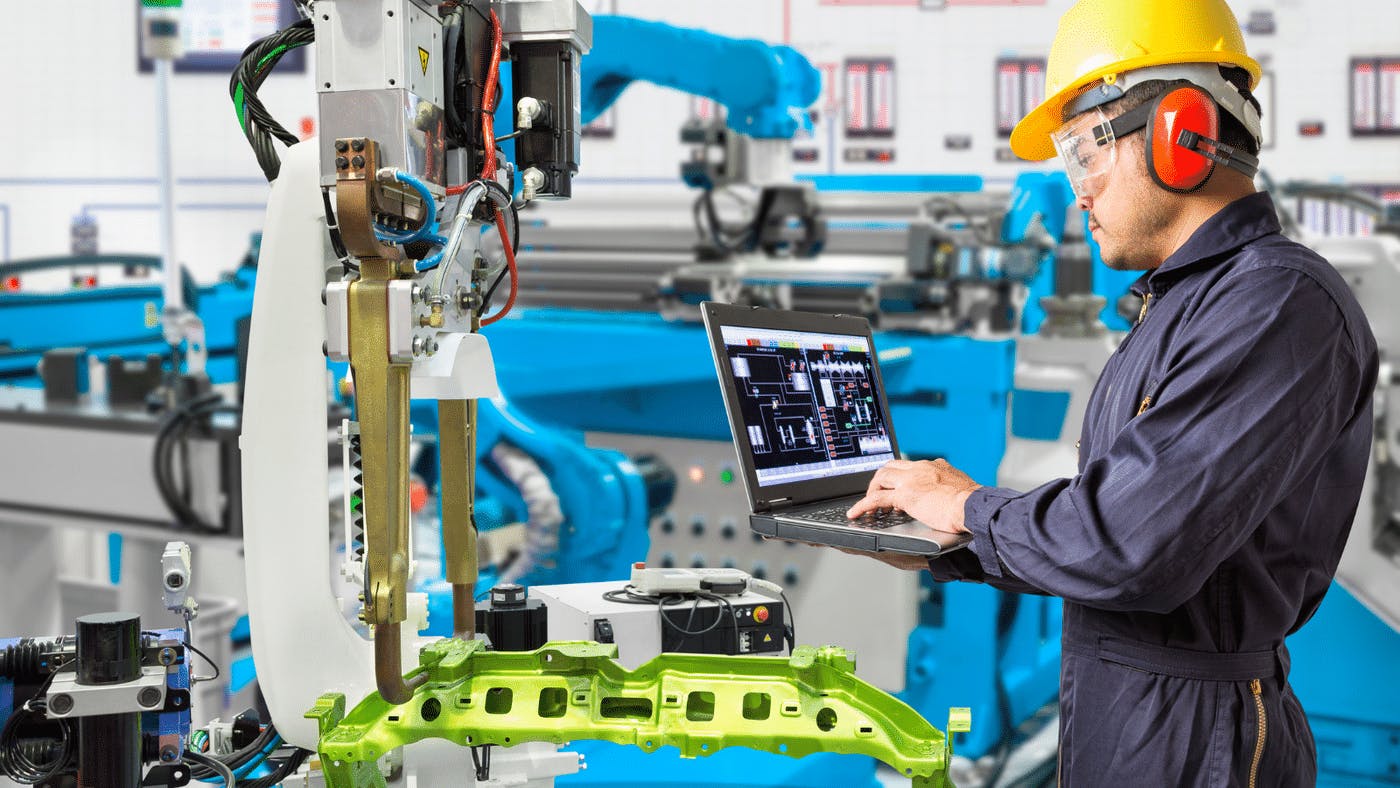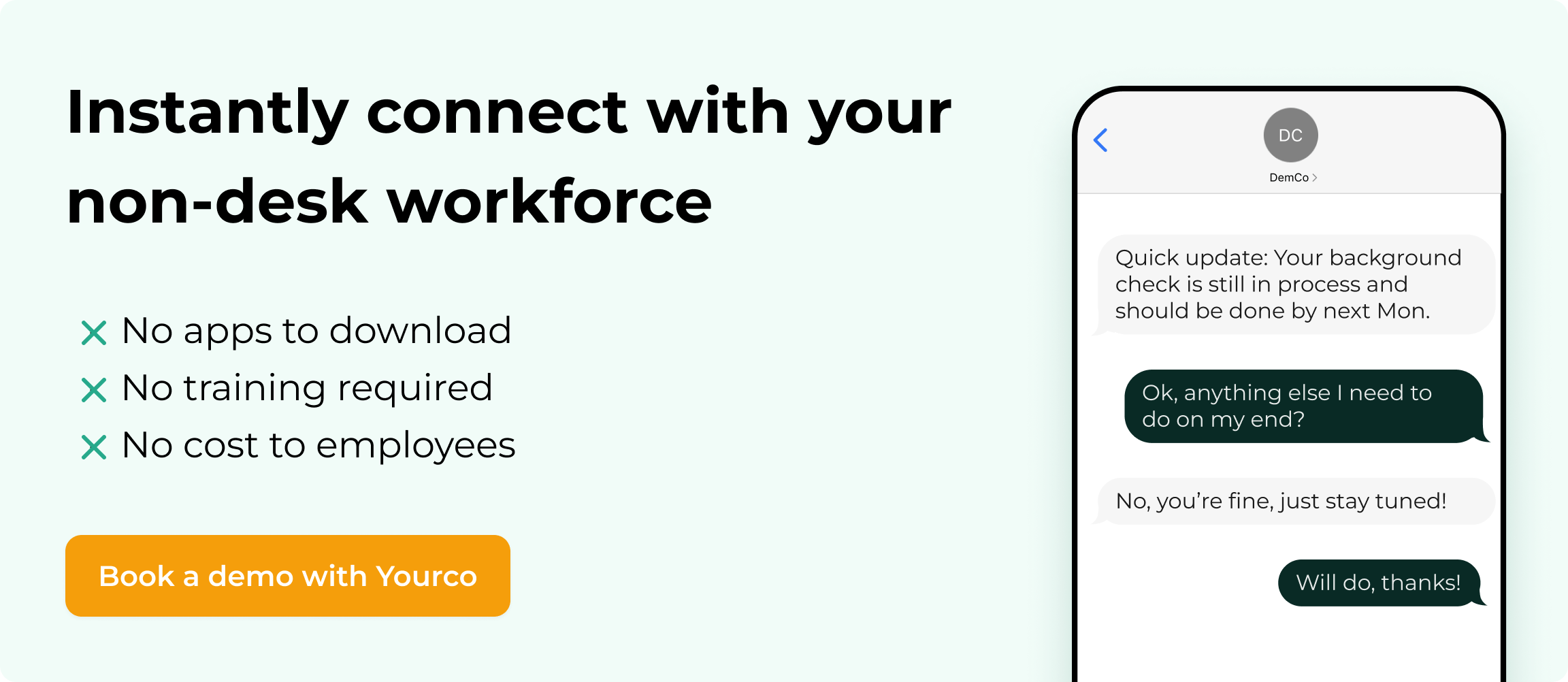6 Effective Strategies to Boost Employee Engagement in Manufacturing


It’s getting harder to keep manufacturing employees engaged. Turnover is high, new hires don’t stick around, and long-time workers are feeling burned out. Many don’t have access to email or company updates, so they miss important info. Others stop speaking up because they don’t think it will make a difference. Over time, that silence leads to lower productivity, more safety incidents, and a culture that just feels off.
The good news is that engagement can be rebuilt without fancy tools or complicated programs. It starts with listening, recognizing effort, and using communication methods that actually reach your team. When employees feel seen and supported, they show up stronger. They care more about the work, and they stay longer.
This article walks through six practical ways to connect with your manufacturing team, build trust, and keep morale high, even across shifts, departments, and noisy factory floors.
The Cost of Disengagement in Manufacturing
Manufacturing companies experience unique hurdles when it comes to employee engagement, and the financial impact can be devastating.
High Turnover Creates Operational Chaos
Many manufacturing organizations are reporting increased turnover year over year. Each departure disrupts production schedules, requires costly recruitment efforts, and demands extensive training for replacements. When experienced workers leave, they take valuable institutional knowledge with them, leaving gaps that can take months to fill.
Communication Barriers Fuel Disconnection
Most manufacturing employees work without regular access to email or company intranets. They spend their shifts focused on production tasks, often in noisy environments where traditional communication methods fail. This creates a dangerous information gap where critical updates about safety protocols, schedule changes, or company news never reach the people who need them most.
Safety Incidents Rise with Disengagement
Disengaged employees are less likely to follow safety protocols, report hazards, or look out for their colleagues. On the other hand, engaged employees tend to have higher safety records, making engagement not just a productivity issue but a fundamental safety concern.
The Business Impact of Better Engagement
When manufacturing companies successfully engage their workforce, the results transform their entire operation:
- Productivity gains exceed expectations: Companies with engaged manufacturing teams are usually more productive, as engaged workers take ownership of their roles, suggest process improvements, and collaborate more effectively.
- Retention rates improve dramatically: Effective engagement strategies can reduce turnover, saving thousands of dollars per employee in recruitment and training costs.
- Quality and safety performance soar: Engaged employees catch quality issues before they become costly problems. They actively participate in safety programs, report near-misses, and help create a culture where everyone looks out for each other.
When engagement becomes part of the everyday culture, those performance gains start to stick. You’ll see better results across every shift, every team, and every site. Below are six proven strategies to engage your manufacturing workforce.
1. Use Technology That Actually Reaches Frontline Workers
The biggest mistake manufacturing companies make is assuming their workforce can access the same communication tools used in office environments. Email reaches less than 20% of manufacturing employees consistently, while SMS messages achieve 98% read rates within 90 seconds.
Implement SMS-Based Communication Systems
Text messaging provides the most reliable way to reach manufacturing employees instantly. Unlike email or apps that require internet access and technical skills, SMS works on any phone, including flip phones that many frontline workers prefer. This approach enables you to send shift reminders, safety alerts, and company updates directly to employees' phones, ensuring critical information reaches everyone regardless of their location or schedule.
SMS communication also enables two-way conversations that make employees feel heard. Workers can quickly report issues, ask questions, or provide feedback without navigating complex systems or waiting for scheduled meetings.
Advanced SMS platforms, such as Yourco, can automatically translate messages into 135+ languages and dialects, ensuring your diverse manufacturing workforce receives information in their preferred language. This immediate connection helps address problems before they escalate and demonstrates that management values employee input.
Deploy Real-Time Surveys and Feedback Tools
SMS-based surveys give you more accurate insights into your workforce's thoughts and concerns. Use brief, targeted surveys to gather feedback on specific topics like workplace safety, schedule preferences, or process improvements. The key is making participation effortless – employees should be able to respond with a simple text rather than filling out lengthy forms.
Consider implementing different survey types throughout the year:
- Monthly pulse surveys for quick mood checks
- Quarterly engagement surveys for deeper insights
- Event-specific surveys after major changes or incidents
Built-in SMS polling features allow you to collect real-time feedback during shift changes or safety meetings, while integration with platforms like SurveyMonkey enables more comprehensive questionnaires when needed.
2. Connect Daily Work to Bigger Company Goals
Manufacturing employees often focus on immediate tasks without understanding how their work contributes to company success. When workers see the connection between their efforts and business outcomes, engagement increases significantly.
Share Customer Success Stories
Regularly communicate how your products impact end customers. When a manufacturing team learns that the components they produce help save lives in medical devices or improve safety in automotive applications, their work takes on greater meaning. Share testimonials, customer feedback, and real-world applications that highlight the importance of quality and precision.
Create a regular communication rhythm that includes customer spotlights, quality achievements, and production milestones. Use concrete examples that employees can relate to, such as "The brake components you assembled this week will help keep families safe on their weekend road trips."
Provide Regular Performance Updates
Keep employees informed about company performance, production goals, and market conditions. When workers understand business pressures and opportunities, they're more likely to contribute ideas and extra effort during critical periods. Share both challenges and successes honestly, treating your manufacturing team as partners in the business rather than just task performers.
Daily communications should include production targets, quality metrics, and safety goals. Weekly updates can cover broader business news, customer feedback, and department achievements. This transparency builds trust and helps employees understand how their individual contributions impact overall success.
3. Foster Community and Recognition Within Your Facility

Manufacturing work can feel isolating, especially across different shifts and departments. Building connections between employees creates a sense of belonging that significantly impacts engagement and retention.
Organize Meaningful Team Building Activities
Plan events that bring employees together outside their normal work routines. Company barbecues, holiday parties, and team competitions create opportunities for workers to connect as people rather than just colleagues. Consider activities that include families, recognizing that many manufacturing employees highly value work-life balance.
Safety competitions, suggestion contests, and skills challenges can combine team building with operational goals. For example, organize monthly safety awareness contests where teams compete to identify and report the most potential hazards, rewarding participation with small prizes or recognition.
Launch Employee Referral Programs
Create referral programs that leverage your existing workforce to find quality candidates. Since non-desk employees may not use LinkedIn or email regularly, SMS-based referral systems ensure opportunities reach your entire team. Text referral links directly to employees, making it easy for them to share job openings with friends or peers who might be good fits.
Employee referrals typically reduce cost per hire, boost candidate quality, and improve retention, with referred hires showing 45% retention rates after two years compared to 20% from job boards. Hired referrals also join faster, about 55% quicker than candidates sourced through career sites, helping you fill critical positions more efficiently.
Implement Peer Recognition Programs
Create systems that allow employees to recognize each other's contributions. Peer recognition often means more than management praise because it comes from people who truly understand the challenges of the work. Establish simple ways for employees to nominate colleagues for going above and beyond, whether through suggestion boxes, text-based nomination systems, or regular team meetings.
Recognition doesn't always require monetary rewards. Public acknowledgment, preferred parking spots, extra break time, or small gift cards can be highly effective. The key is consistency and authenticity. Recognition should be specific, timely, and tied to behaviors you want to encourage.
4. Create Performance-Based Incentives That Matter
Manufacturing employees respond well to clear, achievable goals backed by meaningful rewards. Effective incentive programs align individual contributions with team and company objectives.
Establish Clear, Measurable Goals
Set specific targets that employees can influence through their daily work. Production quotas, quality benchmarks, safety records, and attendance goals provide concrete objectives that teams can rally around. Make sure goals are challenging but achievable, and adjust them based on changing conditions or team capabilities.
Consider implementing tiered incentive structures that reward different levels of achievement. For example, teams might earn bonuses for meeting basic production targets, with additional rewards for exceeding goals or maintaining perfect safety records. This approach motivates consistent performance while rewarding exceptional effort.
Offer Rewards That Employees Actually Value
Research what motivates your specific workforce rather than assuming what they want. Some teams prefer cash bonuses, while others value extra time off, flexible scheduling, or public recognition. Survey employees about their preferences and offer multiple reward options when possible.
Consider non-monetary incentives that address common manufacturing worker concerns:
- Preferred shift assignments or scheduling flexibility
- Better parking spots or upgraded locker assignments
- Additional training opportunities and skill development
- Recognition programs with peer nominations
- Equipment upgrades or ergonomic improvements
Small, frequent rewards often motivate better than large, infrequent ones. The key is ensuring rewards feel meaningful and achievable to your specific workforce.
5. Invest in Professional Development and Career Growth
Many manufacturing employees feel stuck in dead-end jobs with limited advancement opportunities. Providing clear paths for skill development and career progression dramatically improves engagement and retention.
Streamline Onboarding and Training
Create comprehensive onboarding programs that use accessible communication methods to welcome new hires and set them up for success. SMS-based onboarding allows new employees to receive welcome messages, first-day guidance, and training schedules directly on their phones. They can text photos of required documents like IDs or tax forms directly to HR, eliminating paperwork delays and ensuring faster processing.
Deliver training materials through mobile-friendly formats that work on any device. Schedule training sequences via text messages across multiple days to avoid information overload, and send immediate acknowledgment requests to confirm employees have received and understood critical information.
Provide Skills Training and Certification Programs
Offer training that enhances both current job performance and future career prospects. Technical certifications, safety training, and cross-functional skills development show employees that you're invested in their long-term success. Partner with local community colleges or trade schools to provide formal education opportunities, and communicate these opportunities through channels that reach all employees, not just those with email access.
Create mentorship programs that pair experienced workers with newer employees. This approach transfers valuable knowledge while giving senior employees recognition for their expertise. Mentors often report increased job satisfaction from helping develop the next generation of skilled workers.
Support Employee Benefits Engagement
Many manufacturing employees don't fully understand or utilize their benefits packages, leading to lower satisfaction and engagement. Use accessible communication methods to educate employees about health insurance options, retirement planning, wellness programs, and other benefits throughout the year, not just during open enrollment periods.
Send concise benefit summaries via text, ensuring frontline staff understand coverage options and enrollment steps. Automate reminders before, during, and after enrollment periods, and share success stories about how benefits programs have helped other employees.
Create Clear Advancement Pathways
Document specific steps employees can take to advance within your organization. Whether the path leads to supervisory roles, technical specialist positions, or lateral moves to different departments, employees need to see concrete possibilities for growth. Regularly discuss career goals during performance reviews and provide actionable steps for advancement.
Promote from within whenever possible and communicate these success stories to the broader workforce. When employees see their colleagues advancing through hard work and skill development, it reinforces that growth opportunities are real and achievable.
6. Build Robust Two-Way Communication Channels
Traditional top-down communication fails in manufacturing environments. Employees need easy ways to share feedback, report problems, and contribute ideas without fear of negative consequences.
Establish Multiple Feedback Channels
Provide various ways for employees to communicate with management, recognizing that different people prefer different methods. Some workers are comfortable speaking up in group settings, while others prefer anonymous suggestion systems or one-on-one conversations. Text-based feedback systems work particularly well for manufacturing environments because they're quick, convenient, and don't require special equipment or training.
Implement "text off" systems that allow employees to quickly notify supervisors about absences by sending a simple text message instead of making phone calls. This creates clear, written documentation of absence notifications while streamlining schedule adjustments. HR, supervisors, and managers receive immediate alerts when an employee texts off, enabling faster coverage decisions.
Enable Real-Time Incident Reporting
Create systems that allow employees to report safety incidents, equipment problems, or process issues instantly via text message. Workers can snap photos of potential hazards, damaged equipment, or quality issues and send them directly to the company number along with brief descriptions. Every report gets automatically timestamped and logged, creating searchable records for compliance tracking and trend analysis.
This immediate reporting capability helps prevent small problems from becoming major safety incidents or production delays. Managers can respond quickly via text to gather additional details, dispatch maintenance teams, or implement temporary safety measures while permanent solutions are developed.
Respond Quickly and Transparently
When employees provide feedback or report problems, acknowledge their input immediately and follow up with actions taken. Even when you can't implement a suggestion, explain why and thank the employee for their contribution. This responsiveness demonstrates that management values employee input and encourages continued participation.
Create feedback loops that show employees how their suggestions influence company decisions. Share monthly updates on suggestions received, actions taken, and problems solved based on employee input. This transparency builds trust and encourages more people to participate in improvement efforts.
Engage Your Workforce with Yourco's SMS Solutions
Yourco's SMS-based communication platform eliminates the technology barriers that prevent effective engagement in manufacturing environments. With 98% of messages read within 90 seconds, two-way communication capabilities, and automated survey tools, Yourco helps you implement all six engagement strategies seamlessly. Workers can receive shift reminders, participate in pulse surveys, and stay connected to company goals using the simple text messaging they already know how to use.
Advanced features like AI-powered translations support diverse manufacturing workforces in 135+ languages and dialects, while incident reporting capabilities allow employees to text photos and details of safety concerns directly to management. Automated absence reporting streamlines schedule adjustments, employee referral systems help you find quality candidates, and real-time analytics provide workforce intelligence to identify engagement issues before they impact productivity.
Unlike complicated apps that require training and internet access, Yourco works on any phone, including flip phones, reaches employees instantly, and creates the genuine two-way communication that drives real engagement.
Ready to transform your manufacturing culture? Try Yourco for free today or book a demo and discover how SMS communication can revolutionize your employee engagement efforts.
Frequently Asked Questions
How can we measure employee engagement in a manufacturing environment?
Track key metrics like turnover rates, absenteeism, safety incident reports, and participation in company programs. Regular pulse surveys sent via SMS provide real-time insights into employee satisfaction and identify issues before they become major problems. Production quality metrics and suggestion submission rates also indicate engagement levels.
What's the biggest communication challenge in manufacturing?
The primary challenge is reaching non-desk employees who don't have regular access to email or company intranets. Traditional communication methods fail to connect with workers who spend their time on production floors, in warehouses, or across multiple shifts. SMS-based communication solves this problem by reaching employees on devices they already carry and know how to use.
How do shift work and scheduling affect employee engagement strategies?
Shift work requires flexible engagement approaches that work across different schedules and time zones. Automated messaging systems can deliver information at optimal times for each shift, while asynchronous communication methods allow employees to participate in feedback and recognition programs regardless of when they work. The key is ensuring all shifts receive equal attention and communication.
What role does the immediate supervisor play in manufacturing employee engagement?
Front-line supervisors have enormous influence on employee engagement because they interact with workers daily. Effective supervisors communicate clearly, provide regular feedback, recognize good performance, and address problems quickly. Supporting supervisors with communication tools and training dramatically amplifies engagement efforts across the entire workforce.
How can we engage employees who speak different languages?
Use communication platforms with automatic translation capabilities to ensure all employees receive information in their preferred language. This inclusive approach helps non-English speakers feel valued and ensures critical safety and operational information reaches everyone clearly. Regular translation of surveys and feedback requests also enables broader participation in engagement programs.



